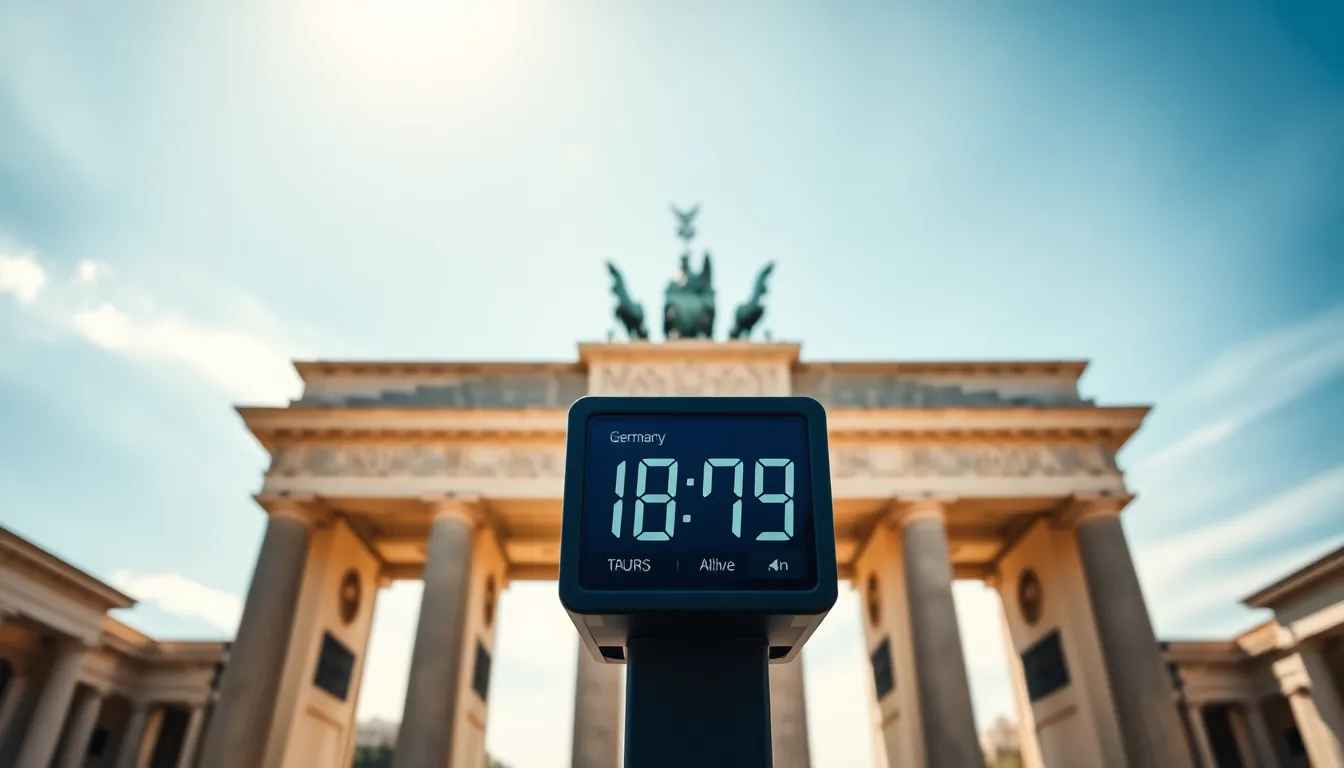When planning a trip to Germany or connecting with friends across the Atlantic, knowing the local time is essential. Germany operates within the Central European Time (CET) zone, which can lead to confusion for those in different time zones. Understanding the time difference can help avoid missed calls or late arrivals.
Germany also observes Daylight Saving Time, shifting to Central European Summer Time (CEST) in late March. This transition can add another layer of complexity for travelers and businesses alike. Whether it’s coordinating meetings or simply figuring out when to catch a live event, knowing the current time in Germany is key to staying connected and making the most of any experience.
Table of Contents
ToggleUnderstanding Time Zones in Germany
Germany operates primarily under Central European Time (CET). Knowing the local time is essential for efficient communication and planning in this diverse country.
Overview of Time Zones
Germany follows Central European Time (CET) during standard time, which is UTC+1. This time zone applies to most of the country. From the last Sunday in March to the last Sunday in October, Germany shifts to Central European Summer Time (CEST), which is UTC+2. This change impacts scheduling for both residents and visitors, necessitating careful time management during these months.
Differences Between Eastern and Western Germany
Time zone differences in Germany are not significant by geographic standards, as the whole country observes CET and CEST. However, cultural and economic influences create time-sensitive variations between Eastern and Western Germany. Western Germany features a more active economy, with business operations often commencing earlier. Eastern Germany’s economic activities can be slightly delayed, leading to potential scheduling discrepancies. It’s crucial for travelers and businesses to consider these regional tendencies while managing appointments and meetings across Germany.
Current Time in Germany

Germany operates under Central European Time (CET) and shifts to Central European Summer Time (CEST) during Daylight Saving Time. Awareness of the current time is vital for coordination and communication.
Time Conversion for Different Regions
Germany follows CET (UTC+1) in standard time and CEST (UTC+2) during Daylight Saving Time. To convert Germany’s time to different regions, use these examples:
| Region | Standard Time (CET) | Daylight Saving Time (CEST) |
|---|---|---|
| New York (UTC-5) | 6:00 AM | 5:00 AM |
| Los Angeles (UTC-8) | 9:00 AM | 8:00 AM |
| London (UTC+0) | 1:00 PM | 12:00 PM |
| Tokyo (UTC+9) | 8:00 PM | 7:00 PM |
| Sydney (UTC+11) | 10:00 PM | 9:00 PM |
Converting time helps avoid misunderstandings related to meeting schedules and communication.
Daylight Saving Time Practices
Germany observes Daylight Saving Time, changing clocks forward one hour on the last Sunday in March and back one hour on the last Sunday in October. This practice aligns with neighboring European nations, facilitating cross-border engagements. The shift can create confusion, so it’s important to adjust schedules accordingly. Awareness of these changes aids in better planning for travelers and businesses operating internationally.
Cultural Impact of Time in Germany
Time plays a significant role in German culture, influencing various aspects of daily life, from punctuality to overall societal structure.
Importance of Punctuality
Punctuality holds immense value in Germany. Being on time is seen as a sign of respect and professionalism. In business settings, meetings start promptly, and late arrivals can be viewed unfavorably. This emphasis on punctuality extends to social gatherings, where guests strive to arrive at the scheduled time. For instance, an invitation for a dinner party typically implies guests should arrive precisely at the stated hour, rather than a few minutes late. This cultural norm fosters an atmosphere of reliability and trust.
Time Management in German Society
Time management is a critical aspect of German society. The structured nature of the workweek, which typically consists of Monday through Friday from 9 AM to 5 PM, reflects this emphasis on efficiency. Employees prioritize task completion within allotted time frames, often leading to higher productivity levels. Moreover, time management principles are often taught from a young age, instilling habits that carry into adulthood. Public transportation systems, such as trains and buses, adhere to strict schedules, reinforcing the societal expectation of adhering to timeliness. As a result, effective time management is integral to both personal and professional success in Germany.
Tools to Check Current Time
Several reliable tools make checking the current time in Germany straightforward and efficient. Utilizing websites and mobile applications can greatly assist in obtaining accurate time information.
Websites and Apps
Numerous websites and apps provide up-to-the-minute time updates for Germany. Popular options include:
- Time.is: This site displays the exact current time and offers a time zone converter. It’s user-friendly and features a global map for easy reference.
- TimeAndDate.com: It provides comprehensive information on time, sunrise and sunset times, and localities within Germany. The site also includes historical and future date calculations.
- WorldTimeBuddy: This app simplifies time zone comparisons, allowing users to view multiple time zones simultaneously. It’s particularly useful for scheduling international calls.
- Clock Zone: The mobile app provides real-time updates and notifications for different time zones, ensuring users never miss important meetings or deadlines.
Each of these platforms accesses reliable time servers, ensuring users receive accurate and current time data.
Clock and Device Settings
Adjusting clock settings on devices is crucial for accurate timekeeping in Germany. It’s important to set devices to update automatically for time changes, especially during Daylight Saving Time. Steps include:
- Smartphones: Enable automatic time settings under the date and time options in device settings.
- Computers: Adjust the time zone to Central European Time (CET) or Central European Summer Time (CEST), depending on the season. Enable the option to synchronize the clock with an internet time server for accuracy.
- Smart Home Devices: Many smart home devices automatically update to the correct time zone, but it’s advisable to verify settings to ensure they reflect local time accurately.
Through websites, apps, and proper device settings, users can seamlessly keep track of the current time in Germany.
Understanding the time in Germany is essential for effective communication and planning. The country’s adherence to CET and CEST can pose challenges for those in different time zones. Awareness of Daylight Saving Time changes plays a crucial role in avoiding scheduling conflicts.
Punctuality is deeply ingrained in German culture, making it vital for both personal and professional interactions. By utilizing various tools to check the current time and adjusting devices accordingly, individuals can navigate these time differences with ease. Staying informed ensures smooth connectivity and fosters respect in all engagements.





